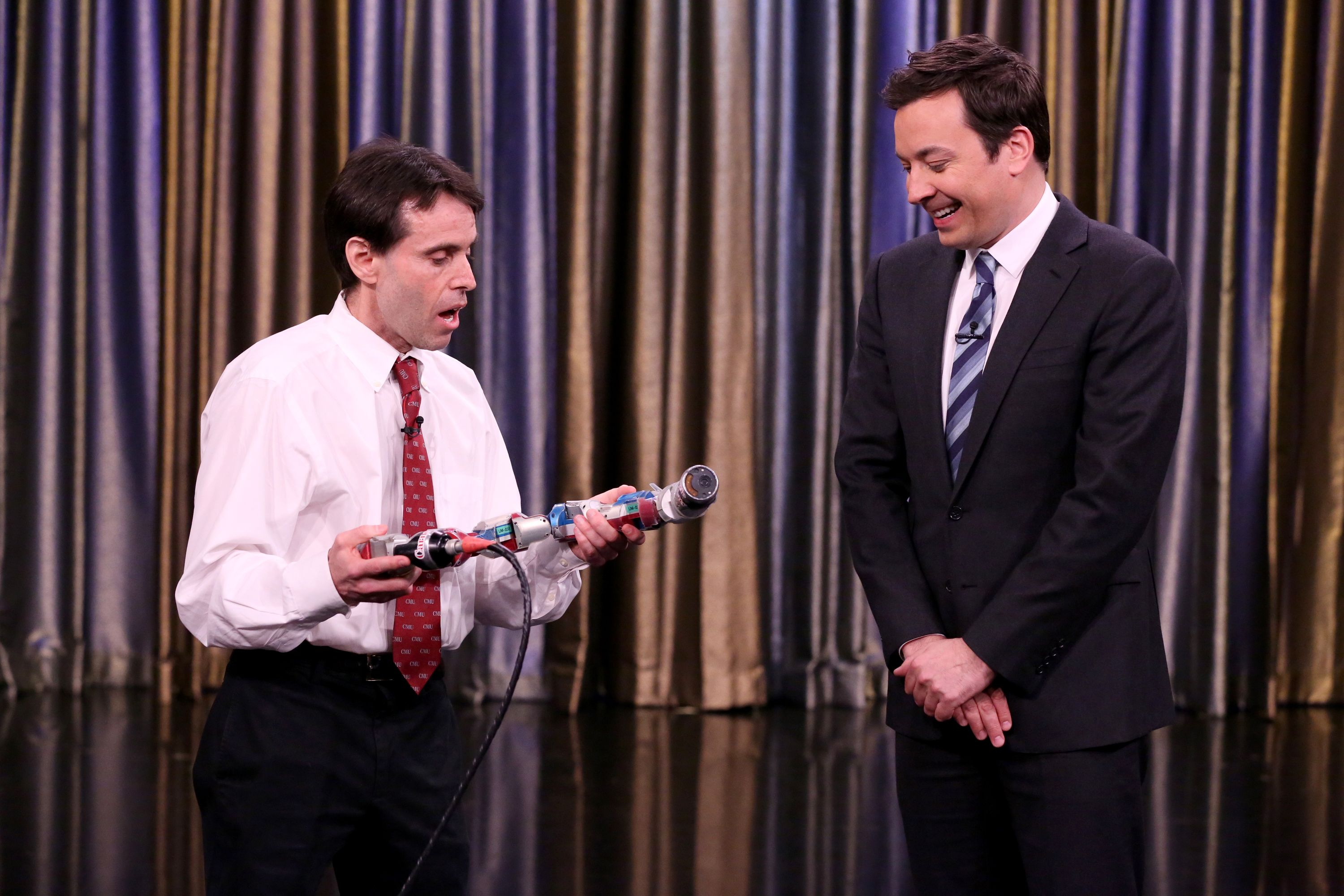
Howie Choset has been named the 2023 Inventor of the Year by the Pittsburgh Intellectual Property Law Association (PIPLA). The award is given to a scientist whose patented developments have been economically significant and/or made positive contributions to society. PIPLA is one of the nation’s oldest organizations dedicated to fostering collegial exchanges regarding the nuances and importance of intellectual property.
Choset grew up on Long Island in New York and received his undergraduate degrees in Computer Science and Business from the University of Pennsylvania in 1990. He went on to earn his Master of Science and Ph.D. degrees in Mechanical Engineering from the California Institute of Technology in 1991 and 1996, respectively. In 1996, Choset joined the faculty of Carnegie Mellon University, where he is currently the Kavčić -Moura Professor of Computer Science and co-director of the Biorobotics Lab.
Choset’s research group has produced over 60 journal papers (including 2 in Science and one in Proceedings of the National Academies of Science), 180 conference papers, 72 invention disclosures, and more than 60 issued patents. Choset’s work has also been recognized by several best paper awards and nominations at ICRA, IROS, and other robotics meetings. In 2005, MIT Press published a textbook, lead authored by Choset, entitled “Principles of Robot Motion.” As if he is not busy enough, Choset is also a founding Editor of the journal Science Robotics and is currently serving on the editorial board of the International Journal of Robotics Research.
Choset has received numerous awards and honors for his contributions to robotics, including being elected by the MIT Technology Review in 2002 as one of the top 100 innovators in the world under 35. In 2014, Popular Science selected Choset’s medical robotics work as the “Best of What’s New in Health Care.” In 2015, Choset was named a Fellow of the Institute of Electrical and Electronics Engineers (IEEE). In 2019 and 2022, respectively, Choset received the Engleberger Award and the Doherty Award for his sustained contributions to excellence in research and education.
Beyond his research and awards, Choset has played a critical role in shaping national policy for robotics and in building public awareness of the importance of robotics for the nation’s future. His work under the National Robotics Initiative, a White House initiative launched by President Obama and shaped by congressional initiatives through the House Robotics Caucus, helped to accelerate the development of robots that work cooperatively with people. Choset’s leadership in shaping the national agenda also includes serving on the AdCom committee for the IEEE Robotics & Automation Society and representing the United States in the Global Partnership for Artificial Intelligence. Choset also functions as a public ambassador to the field of robotics, having appeared everywhere from the Crazy Hard Robots Podcast to The Tonight Show with Jimmy Fallon.

THE TONIGHT SHOW STARRING JIMMY FALLON — Episode 0661 — Pictured: (l-r) Researcher Howie Choset and “Snakebot” with host Jimmy Fallon during “Tonight Showbotics” on April 25, 2017 — (Photo by: Andrew Lipovsky/NBC/NBCU Photo Bank)
At the heart of Choset’s work is his commitment to solving complex problems using innovative robotic systems. In particular, his research related to snake robots and motion/path planning has resulted in a staggering number of innovations in a wide variety of fields.
One complex problem Choset sought to solve in the early 2000s was how to create a medical snake robot that was small and maneuverable, yet retained some structural strength while in motion. Along with Marco Zenati and Alon Wolf, Choset solved this problem by designing a mechanism whereby he was able to get four cables to marionette one-hundred degrees of freedom by using concentric tubes that would take turns being rigid or limp. Choset describes this technology in an interview found here and in more detail in the abstract of U.S. Pat. No. 9,011,318:
“A highly articulated robotic probe (HARP) is comprised of a first mechanism and a second mechanism, one or both of which can be steered in desired directions. Each mechanism can alternate between being rigid and limp. In limp mode the mechanism is highly flexible. When one mechanism is limp, the other is rigid. The limp mechanism is then pushed or pulled along the rigid mechanism. The limp mechanism is made rigid, thereby assuming the shape of the rigid mechanism. The rigid mechanism is made limp and the process repeats. These innovations allow the device to drive anywhere in three dimensions. The device can “remember” its previous configurations, and can go anywhere in a body or other structure (e.g. jet engine). When used in medical applications, once the device arrives at a desired location, the inner core mechanism can be removed and another functional device such as a scalpel, clamp or other tool slid through the rigid sleeve to perform.”
Choset went on to co-found the CMU spin-off company Medrobotics to further develop this technology into a snake-like surgical robot for minimally invasive surgeries, dubbed the “Flex® Robotic System.” In 2014, it received European CE mark clearance and in 2017 it became the first medical device to clear the FDA with the word “robot” in its indication. Since that time, the Flex® Robotic System Choset pioneered has been used on over 1,500 different patients in more than 2,000 procedures over four continents and in seventeen countries. This has resulted in less patient pain, lower medical costs, wider availability, shorter recovery times, and improved outcomes for patients.
While Medrobotics was succeeding in the field of medical robotics, Choset also began work on a new technology he informally called “Modular Robotic Units”. This technology focused on a system of creating a snake robotic system that was testable and reliable enough to use in safety-critical field deployments, while at the same time being easily modifiable and able to integrate quickly with new research code. As described in U.S. Pat. No. 9,597,796, this technology exploited the concept of “behaviors” to create a system of connected robotic modules, allowing for modular custom robotic solutions.
In 2014, Choset Founded HEBI Robotics to help bring his “Modular Robotic Units” to the world. As he put it, “we want to accelerate the development of robotics by endowing developers with the ability to put robots together in a relatively short time and not have to worry about all of that low-level crap that you have to deal with when putting together robots for the first time.” Since then, HEBI Robotics has partnered with the likes of NASA, Siemens, MIT, and others to provide the world with flexible, real-time, and modular robots that can be used for everything from manufacturing to bridge inspection.
Beyond Medrobotics and HEBI Robotics, Choset has founded and/or been involved with several other robotics companies coming out of Carnegie Mellon University, including:
- BITO Robotics – providing autonomous guided vehicles for manufacturing and logistics
- Latent Robotics – improving and automating recycling
- Omnibus Medical Devices – providing robotic and sensor technology for a low-cost ventilator
Additionally, in 2020, Choset co-led the formation of the Advanced Robotics for Manufacturing (ARM) Institute with Dr. Gary Fedder. The ARM Institute, a $250 million dollar national institute advancing both technology development and education for robotics in manufacturing, has garnered national attention since its founding. In January 2022, President Joe Biden visited the ARM Institute, further emphasizing the importance of the organization in the future development of the U.S. economy.
Choset’s expertise in snake robots and motion planning has been instrumental in advancing the field of robotics as well as the robotics-based economy. The breakthrough technologies he has developed over his career have enabled robots to perform tasks that were once considered impossible. From navigating treacherous terrain for search and rescue operations to performing minimally invasive surgeries with dexterity and precision, Choset’s innovations have had a profound impact in a wide array of environments – from factories to disaster zones to operating rooms.